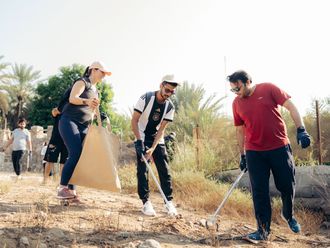In mid-July, Stephen and Joanna Pennington of Greater Manchester, UK, were devastated: their 12-year-old daughter Shevaun had gone missing.
Fears were heightened, for a year ago, two 10-year-old friends, Holly Wells and Jessica Chapman, had disappeared from Soham, Cambridgeshire. Two weeks later, their decomposed bodies were found in a ditch in an isolated location in the Mildenhall area of Suffolk, about 10 miles from the girls' hometown.
Investigators launched a hunt for Shevaun, but it soon transpired that the girl had run away with Toby Studabaker, 31, a former US Marine, to Paris. They had met in an Internet chatroom, and their friendship blossomed over a year.
Studabaker had served in Afghanistan and was discharged with a shoulder injury. His wife died of leukaemia last year. FBI investigations revealed that he used to spend five to six hours online a day.
He flew to Manchester to meet Shevaun, and the pair travelled out of Heathrow to Paris. Their flight of fancy then took them to Frankfurt. A few days later, Shevaun was reunited with her parents, and Studabaker held for abduction.
The former Marine claimed he was under the impression that Shevaun was 19 and stressed that he did not harm the girl in any way. The incident has raised one disturbing question: How safe are our children at our own homes, leave alone Internet cafes?
The Holly Wells and Jessica Chapman case has not been closed and the authorities have the accused in custody. While their grisly deaths may not be linked to a chatroom 'friend', we have to ask ourselves: Are our children safe at home, the school and the playground? Three areas where they should be free, safe and snug; where they can relish childhood and have wholesome fun.
Chatting over the Internet has become sort of an addiction for many, young and old, who spend hours looking for friends, while some fish for a little bit more…
Matter of curiosity
Tia Zup, resident in Dubai, is 18. She had heard the joys of Internet chatrooms from her friends who frequently enter sites from the security of their homes to have a natter with like-minded people, age being no bar.
Curiosity finally got the better of her, and Tia learnt the basics of chatroom language. Recently, one afternoon, she went online and within five minutes, she was in the game: Shail9 had spotted her, and zeroed in. Hardly any chatter ever reveals his or her true identity.
An innocuous 'hi' he said. Tia typed in 'asl', which in chatroom parlance means age, sex and location. She seemed eager to make friends.
Seconds later, there were chatters swarming, like sharks in a feeding frenzy. There was Soulful Sav, Intensive Enigma, Inventive Koolkiran, Curousnikster, Cool_dude22, dudes with other numbers and Cheetah loves U.
Some wanted to know Tia better and some came courting, albeit not like gentlemen would whispering sweet nothings. Tia kept her counsel, trying to ward them off politely, abiding by etiquette. Then there was Sos_h, who wanted Tia's telephone number and e-mail ID.
He wasn't being unfair because he promptly passed on his mobile phone number, without even a shadow of hesitation. Tia was a bit surprised… she refused to divulge her telephone number and said adieu to Sos_h.
And all the while, Shail9 watched the prey as Harrypr10 and NoTTy_INTention dallied with the young girl. Shail9 then made his move, and this time his words weren't laced with niceties. He was vulgar and uncouth. A stunned Tia quickly regained her composure and fled the chatroom.
Some teenagers are curious, while others a victim of peer pressure. Still others feel it is the ideal way to while away a few hours. But why do youngsters get 'hooked' to chatting? What thrill does it offer?
Deemah Abdullah, 14, says it is a good way to spend time and catch up with friends. She stresses that one must know the dangers of chatting. "Peers will tell you which rooms you should never enter and ones that are safe. Then it is your decision. I knew some people who used to visit these dangerous chatrooms and they are not my friends anymore. I know my friends well… I only talk to them."
Amjad Saeed Abdul Ghani, 20, a student of computer engineering at the American University in Sharjah, says chatting is a waste of time. "There's no point in chatting, what purpose does it serve? These days chatrooms have become outlets for deviant behaviour. Many people use vulgar language.
"Some get addicted to chatting. They can't stop the habit. I know some people who have stopped chatting and become addicted to network games. There are, however, two sides to chatting: one it can develop your personality, teach you social interaction and the other side is the negative aspect… offensive language. Chatting should be controlled."
Necessity
Most parents believe the Internet has become a necessity, but its perils have to be ingrained in children as well.
Petra Al Naqeeb, mother of an 18-year-old girl and owner of nursery schools in the UAE, says: "Chatrooms are dangerous, but I have a very sensible daughter. So it has never been a problem.
Parents should always be involved in what their children are doing. Internet is the future, the way forward; you cannot stop children using it. It is a wonderful tool and should be used.
"But, you should have an open communicative relationship with your child; discuss issues such as dangers of chatrooms with them. Ultimately it comes down to a child's upbringing - they have to learn to stand up for their beliefs and values.
"You should also be aware of their friends and the backgrounds they come from. Be an active parent. A lot also has to do with the community you live in. In the West, children are exposed much more, while here they are protected to a great extent. I am not very sure, but I think you can have safety systems like firewalls installed in your computer, so that they do not come across it inadvertently. There has to be a relationship of trust between parents and children."
Abdulbasit Merdas is the vice president of the Emirates Thalassemia Society. A UAE national father of four, his oldest is 13 years of age. "My children use the Internet all the time. They do have online chat sessions with their friends. They know their friends online identification names and are only allowed to chat with those they know.
"We monitor them very closely. If I find them talking to anybody unknown or entering strange sites, it will be the end of computer usage in the house - that has been made very clear.
"Chatrooms are dangerous, and children are susceptible to adult deceptions. Parents should acquaint themselves well with the technology and its perils. People come into chatrooms with fun names, but it can lead to something very bad. You have to be strict with children and protect them. Always communicate with them and know what they are doing.
Careful
"Our society is more involved with their children as opposed to western society. This is a good thing."
Haider Imam is the manager of an Internet café who says teenagers and the middle aged come to chat, browse the Net for work or attend to e-mails. The older age group visits the café to ca
What lurks in the shadows of the chatroom
What lurks in the shadows of the chatroom










